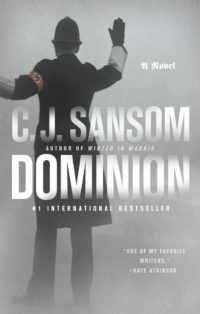CHARACTERS: 2.5/5
WRITING STYLE: 4/5
CLIMAX: 3.5/5
ENTERTAINMENT QUOTIENT: 3/5
Alternative history is a genre that has a very niche audience because of the background knowledge one needs to have to really appreciate or even understand the work.
In the case of Dominion, which falls under this genre, it wouldn’t be very troubling as most of us are familiar with WWII history.
The point at which the story digresses from true facts, is 1940, specifically the outcome of British Elections in 1940.
In Dominion, and contrary to reality, Winston Churchill is defeated and Beaverbrook comes to power, who makes peace with the Germans.
All war hostility with Germany ceases and the British Jews are saved from persecution for the time being. Churchill is against this line of action, and foretells that sooner or later they will come after the English Jews as well; he is accused of sedition and his party is banned.
Operating from underground he runs a group of dissenters, not so ingeniously called the ‘Resistance’
It is around this setting that Sansom’s much-lauded novel revolves. The characters are mainly Resistance people posted secretly in government departments.
One day, information seeps through that some English scientist may have unknowingly learned some important details of the American nuclear program, which could prove disastrous if it fell into the wrong hands.
And as it so (typically) happens, that scientist is an old classmate of the protagonist, who is a Resistance informer. So the entire machinery begins to rumble to get the scientist to safety and out of the predicament he’s put himself in. He goes crazy learning the information and is taken to a mental hospital.
In all honesty, reviewing a book without bias is difficult if you are aware of how it’s been received by the wider audience – the cover greets you with snippets from some of the largest publications like Time and The Guardian.
That aside, I find it difficult to concur with the others.
The characters are archetypical and the plot is too thin to make it any bit thrilling – almost everything is predictable.
Muncaster, the English scientist, has a troubled childhood and develops an odd nature. Only towards college does he gain some foothold in social life and to his is rescue is none other than our protagonist; painfully typical.
The writing style is somewhat a relief. The interwoven narratives provide a good change of perspective at the end of every chapter.
It’s something like the film Vantage Point, where a singular event is presented from different people’s ‘vantage point’.
Though this isn’t a unique method or as good as some of the masters like Leon Uris, the author makes it blend well with the story, adding to the overall quality of the work.
On the whole, Dominion is not overly impressive but worth a read. The characters are typical and there is a lack of depth.
However, the writing style is quite enjoyable and lends some reason for purchasing the book. Although given its rather simple plot, the editors could have done a better job – 600 pages simply aren’t justified.
